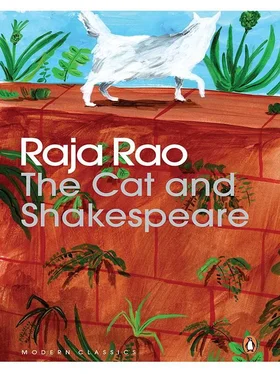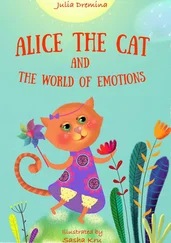Rao Raja - The Cat and Shakespeare
Здесь есть возможность читать онлайн «Rao Raja - The Cat and Shakespeare» весь текст электронной книги совершенно бесплатно (целиком полную версию без сокращений). В некоторых случаях можно слушать аудио, скачать через торрент в формате fb2 и присутствует краткое содержание. Год выпуска: 2014, Издательство: Penguin, Жанр: Современная проза, на английском языке. Описание произведения, (предисловие) а так же отзывы посетителей доступны на портале библиотеки ЛибКат.
- Название:The Cat and Shakespeare
- Автор:
- Издательство:Penguin
- Жанр:
- Год:2014
- ISBN:нет данных
- Рейтинг книги:4 / 5. Голосов: 1
-
Избранное:Добавить в избранное
- Отзывы:
-
Ваша оценка:
- 80
- 1
- 2
- 3
- 4
- 5
The Cat and Shakespeare: краткое содержание, описание и аннотация
Предлагаем к чтению аннотацию, описание, краткое содержание или предисловие (зависит от того, что написал сам автор книги «The Cat and Shakespeare»). Если вы не нашли необходимую информацию о книге — напишите в комментариях, мы постараемся отыскать её.
The Cat and Shakespeare — читать онлайн бесплатно полную книгу (весь текст) целиком
Ниже представлен текст книги, разбитый по страницам. Система сохранения места последней прочитанной страницы, позволяет с удобством читать онлайн бесплатно книгу «The Cat and Shakespeare», без необходимости каждый раз заново искать на чём Вы остановились. Поставьте закладку, и сможете в любой момент перейти на страницу, на которой закончили чтение.
Интервал:
Закладка:
‘How right you are,’ said the judge, flabbergasted. He had never thought of this before. ‘Tell me then, Mr Govindan Nair, how can a judge know the truth?’
‘By being it,’ said Govindan Nair as if it were such a simple matter. After all, he had cut a passage in the wall where Shridhar used to talk to Usha. After all, who could say Bhoothalinga Iyer had not gone to Coimbatore? For example, Abraham could not, as he would lose his job (and with it his green B.S.A. bicycle) if the boss returned. Suppose Shantha’s child were really Bhoothalinga Iyer reborn? Who could know? The cat could, was Govindan Nair’s conviction.
‘Tomorrow I’ll bring the cat to court,’ he said, as if asking the judge’s permission. Of course, what wrong could Govindan Nair have done? Could you ever see a man so innocent? Anybody could see he played with children and the scale. And when one side was heavy, he put two kids on the other side to make the balance go up. Then he brought the needle to a standstill, holding it tight. Thus the balance was created among men. When two things depend on each other for their very existence, neither exists. That is the Law of law.
‘The cat, sir, will do it,’ he said. The judge consented.
Next day I sent Usha with Shantha (the baby was left at home with Tangamma to look after him). The cat was carried in a big cage.
When the court opened its deliberations, the Government Advocate said: ‘My Lord, we are facing judgment against judgment. We must be careful. We have, as witness, a cat.’
‘Why not? We are in Travancore.’
‘I thought so too, Your Lordship. Why should we follow the proceedings of any other court of the world, were it His Majesty’s Privy Council in London? If a cat could be proved to prove any evidence we might set a precedent.’
‘My Lord,’ said Govindan Nair, rising. Crowds had gathered at the courthouse. Such a thing had never happened before. It was not even a political case. (There was no Gandhi in it.) Women were somehow convinced that Govindan Nair was an innocent man. Some of them had seen him in the ration shop. Others had gone to have ration cards issued. Some had noticed him give way to ladies when the bus was overcrowded. Such things are never forgotten by women. They always feed the child in their womb whether the child be there or not. Who knows, some day.
‘My Lord, I am not sure this copy of my signature is correct. Could I have the original?’
‘The original is in the files,’ said the court clerk.
‘How could it be wrong?’
The cat escaped from Shantha’s hand and ran all over the court. Nobody wanted to stop the proceedings or to laugh. Either would be acknowledging that the cat was there. It went right over to the Government Advocate and sat in front of him as if it were going towards itself. The silence was so clear, one could see the movement of the cat’s whiskers. One had no doubt the cat was there. And it knew everything. Each movement was preceded by a withdrawal, recognition, and then the jump. The cat jumped straight on to the judge’s table. And before the attendants could brush it away, it leaped down and fell over one of those huge clay office inkpots kept under tables, and, turning through the back door, went into the record room. The court clerk was looking at the file. The cat did nothing. It stood there. The attendants came and stood watching the cat. Then the cat lay down on the floor and started licking its fur. Govindan Nair was burring something in the court. The attendants, seeing the cat doing nothing, went back to the court.
The cat suddenly jumped on to the shoulder of the clerk and started licking his neck. He felt such sweetness in this, he opened file after file. The cat now jumped over to the table and sat. Usha came from the back, led by an attendant, and took the cat in her arms. The clerk had indeed found the paper.
‘May I see it, Your Lordship?’ asked Govindan Nair.
‘Yes, here it is,’ said the judge, but at the last moment he held it back. For just as he was handing the paper over, the light from the ceiling — a sunbeam, in fact — pierced through the paper, or maybe it was just electric light. Underneath the signature was another signature. When the judge had read it, he handed it over to the Government Advocate. He read it and said: ‘Bhoothalinga Iyer himself signed this. How did this happen?’
‘Yes, sir. That is how it was. Rama Iyer made a slight mistake. After all Bhoothalinga Iyer and he are both Brahmins. He wanted to save Bhoothalinga Iyer. It is plain as could be.’
‘Then why did you admit all that you have admitted?’
‘I have in all honesty admitted nothing.’
‘Oho,’ shouted Tirumalachar.
‘Go on,’ said the judge.
‘Sir, why do we admit then that a chair is a chair?’
‘Why, have you not seen a chair?’
‘Ho, ho!’ shouted the crowd.
‘Has anyone seen a chair?’ asked the judge.
‘Nobody has,’ said the Government Advocate. He was plainly taking sides with the accused.
The judge said: ‘I sit on a chair.’
‘Who?’ asked Govindan Nair.
The judge in fact rose up to see who sat on the chair. He went round and round the table looking at who? There was such silence, the women wept. The cat jumped on to the dais. The attendants said nothing. The Government Advocate was chatting happily with Govindan Nair. Who said there was a case? The clerk was looking for the file to put back the paper. Usha put a garland around the neck of Govindan Nair.
That was the fact. Govindan Nair was not set free. He was free. Nobody is a criminal who has not been proven criminal. The judge had to find himself, and in so doing, he lost his seat. Who sits on the judge’s seat became an important subject of discussion in Travancore High Court. Since then many learned treatises have been written on the subject.
It was all due to Govindan Nair. He had, while in prison, written out a whole story to himself. Bhoothalinga Iyer had signed the paper. It had nothing to do with ration permits. It had to do with Bhoothalinga Iyer’s extramarital propensities. In this business he came across virtue. So instead of going to Benares he gave the money to the widow of a Brahmin, an Iyengar woman in fact. (The breasts and other things were added to make the story comply with film stories.) The story came true as he wrote it. He was sure that it was a fact. He told himself again and again and told it in court again and again. At night the prison wardens were surprised to see him talking to himself. Actually he thought he was addressing the court. He even made and remade the necessary gestures. Wardens could think he was practising acting. He recited his prose precisely till he knew every situation by heart. That is why he was so cocksure in open court. After all, only a story that you write yourself from nowhere can be perfect. You can do with it what you want to do with it. (Abraham wrote romantic poetry and he said it did with him what it wanted. So, eventually, he married Myriam, etc.) But Govindan Nair had the liberty the judge did not have. Only the Government Advocate knew everything. A fact is a prisoner. You are free, or you become the prisoner, and the fact is free, etc., etc. So the Government Advocate knew the accused was no accused. He was one with the accused. That showed why the cat went to the Government Advocate first. The cat also kissed the clerk on the neck.
Bhoothalinga Iyer’s signature was revealed by a sunbeam. Was Bhoothalinga Iyer then in Coimbatore?
Mr Justice Gopala Menon was the son of the late Peshkar Rao Bahadur Parameshwara Menon, and he had only three months of service before retirement. He took leave preparatory to retirement and went to the Himalayas, so people said. Govindan Nair laughed and remarked: ‘You no more find the truth in the Himalayas than you find it in the Indian Law Register. You may find it on your garden wall and not know it was it. You must have eyes to see,’ he said desperately to me.
Читать дальшеИнтервал:
Закладка:
Похожие книги на «The Cat and Shakespeare»
Представляем Вашему вниманию похожие книги на «The Cat and Shakespeare» списком для выбора. Мы отобрали схожую по названию и смыслу литературу в надежде предоставить читателям больше вариантов отыскать новые, интересные, ещё непрочитанные произведения.
Обсуждение, отзывы о книге «The Cat and Shakespeare» и просто собственные мнения читателей. Оставьте ваши комментарии, напишите, что Вы думаете о произведении, его смысле или главных героях. Укажите что конкретно понравилось, а что нет, и почему Вы так считаете.












